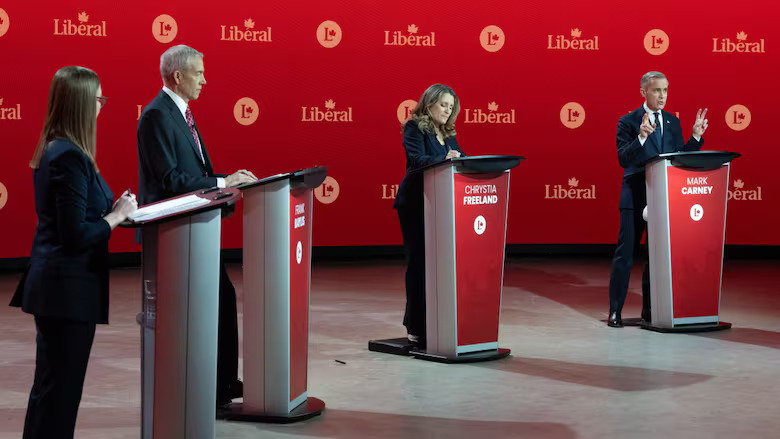The four contenders for the Liberal Party of Canada’s leadership—Chrystia Freeland, Mark Carney, Karina Gould, and Frank Baylis—took the stage for their final debate on Tuesday night as the race to replace Prime Minister Justin Trudeau enters its last stretch. With the leadership vote set for March 9, the candidates used their final opportunity to differentiate themselves, attack their opponents, and lay out their visions for the party’s future.
A recurring theme of the night was Donald Trump, with all four candidates positioning themselves as the best person to handle the former U.S. president’s trade threats against Canada. Freeland, who negotiated the Canada-U.S.-Mexico Agreement (CUSMA), argued that her experience made her uniquely suited to take on Trump, calling him the greatest challenge Canada has faced since World War II. Carney leaned on his background as Bank of Canada and Bank of England governor, emphasizing his crisis management skills, while Baylis framed himself as a business-savvy strategist who could predict Trump’s moves. Gould, in turn, vowed to stand her ground, arguing that “men like Trump” have underestimated her before.
Beyond Trump, Pierre Poilievre was another target. Carney slammed the Conservative leader for refusing security clearance on foreign interference briefings, calling it “irresponsible.” Freeland warned that Poilievre in power would spell the end of climate action in Canada, while Baylis pledged to expose him as a “career politician.” Gould, who previously clashed with Poilievre in Parliament, positioned herself as his toughest adversary in a general election.
Throughout the debate, Carney made a visible effort to distance himself from the Trudeau government, despite serving as an advisor. He argued that Canada’s economy was already weak before Trump’s tariff threats and vowed to bring “the right change” if elected. At one point, he subtly criticized the Liberal government’s defense spending decisions, saying that funds should be kept in Canada rather than sent abroad. Baylis also sought to carve out space between himself and Trudeau, arguing that his business background made him the best candidate to revive the economy.
While the debate was largely cordial, Gould took some subtle jabs at Carney, questioning his trade strategy and defense spending commitments. She also pushed back on his sudden focus on housing affordability, suggesting it wasn’t a priority for him before the debate. In a rare moment of tension, she rebuked Carney’s claim that the economy is weak, stating that she wouldn’t “talk down Canada.” Freeland echoed her remarks, warning against “Conservative talking points” that paint the country as broken.
On climate policy, candidates diverged on Trudeau’s consumer carbon tax, a key target of Poilievre’s attacks. Gould was the only contender to fully support keeping the tax, though she promised not to increase it. Freeland, Carney, and Baylis all signaled a shift away from the policy, with Freeland stressing that leadership requires listening to Canadians, many of whom have rejected the tax’s current structure.
With the leadership vote just weeks away, the final debate provided one last chance for the candidates to define themselves before Liberals decide who will take on Trump, Poilievre, and the next federal election.

